The Alliance Fastpitch launched their inaugural 'Stars of Tomorrow' series event in November 2022 as a data-driven player identification and development program for freshmen, sophomores and juniors. As the Official Vision Evaluation and Training Partner of The Alliance Fastpitch, Vizual Edge put all players through a visual skills baseline assessment, the same test used by Team USA, MLB, Athletes Unlimited and NCAA organizations. The Alliance Fastpitch completed a total of four 'Stars of Tomorrow' (SOT) events during the 2022-2023 season, with the next round of events starting in June 2023.
Vision is commonly thought of as just needing contacts, glasses or having '20/20', but it is often confused with sight. Vision relies on an individual's ability to identify, process and react to what their eyes are seeing. Considering over 80% of sensory information is visual, vision plays an undisputed vital role into the performance of softball players. There's more to softball performance than having a great swing or elite power, and vision can be thought of as the unofficial 'sixth tool' in hitting that makes up a complete player.
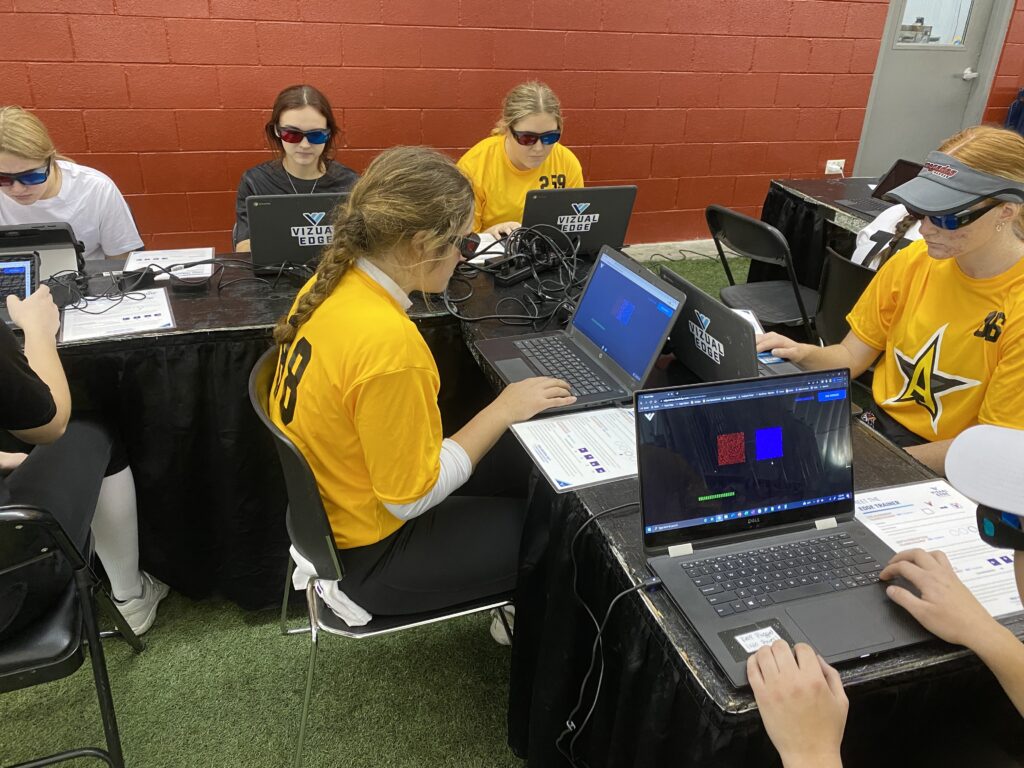
Vision is a trainable skill that can be directly improved from home, using our online Edge Trainer platform, and something that all Alliance players unlock exclusive discounts for. Improved Edge Scores lead to improved performance on the field and can ultimately increase an athlete's likelihood of playing at the next level and receiving a NCAA scholarship. Our research shows that players who generally score higher on our baseline test, tend to be better players and ones who make it further in their softball careers.
As we dive deeper into the Vizual Edge metrics from all four SOT events, we take a look at the top 5 players in four of the key visual skill categories and where each measurement impacts a player’s on-field performance. We also take a look at the visual skill differences in Exit Velocity and Hard-Hit % metrics provided by industry tech leaders such as Yakkertech.
| Rank | Name | Edge Score | Position | Grad Year | Travel Team |
| 1 | Miranda Carroll | 85.24 | P | 2024 | Bombers Gold American |
| 2 | Julia Simon | 84.67 | C | 2026 | California Riptide |
| 3 | Samantha Gonzalez | 84.22 | C | 2025 | MSP Stars |
| 4 | Kalea Tindal | 83.17 | OF | 2026 | OC Batbusters |
| 5 | Karlee Ford | 83.00 | OF | 2024 | Kansas Renegades |
The Edge Score is a comprehensive score out of 100 that takes the core-six visual skills into account, providing athletes, parents, coaches and scouts with a benchmark number for assessing an athlete’s overall visual ability. In general, the higher the Edge Score, the higher chance of athletic success.
| Rank | Name | Convergence | Position | Grad Year | Travel Team |
| 1 | Karlee Ford | 63 | C | 2024 | Kansas Renegades |
| T2 | Julia Simon | 61 | C | 2026 | California Riptide |
| T2 | Miranda Carroll | 61 | P | 2024 | Bombers Gold American |
| 4 | Chrysta Coy | 55 | OF | 2024 | Athletics Mercado |
| 5 | Marina Taveras | 54 | SS | 2025 | Illusions Gold |
Arguably the most important visual skill in softball, Convergence relates to a player's ability to focus on a pitch as it approaches the final 15-20 feet to the plate. Many top hitters in have elite Convergence scores, another attribute that helps separate them from average hitters.
Convergence has also been a skill that is linked to exit velocity (EV). The maximum Convergence station score on the assessment is 77, and SOT players whose exit velo was at/above 58 MPH had Convergence scores 30% higher than those below that mark.
| Rank | Name | Divergence | Position | Grad Year | Travel Team |
| 1 | Olivia Coglianese | 46 | OF | 2025 | Chicago Cheetahs |
| 2 | Parker Levasseur | 43 | OF | 2026 | Extreme Elite National |
| T3 | Avery Layton | 42 | P | 2025 | Extreme Elite National |
| T3 | Catie Luzzi | 42 | P | 2024 | Oak Park Windmills |
| 5 | Dania Durr | 41 | 3B | 2024 | Buzz Gold |
Similar to the scoring of Convergence, Divergence is also scored out of 77. Generally a more difficult skill compared to Convergence for softball players, mainly due to the nature of the sport, Divergence focuses on the ability to locate objects from a distance and often tied to power and homerun rate. However, pitchers and outfielders tend to naturally be better at diverging, due to the requirements of their position looking 'outward' or 'from a distance' towards a given target. Similar to Convergence though, SOT players whose exit velo was at/above 58 MPH had Divergence scores 17% higher than those below that mark.
Divergence plays a key role in early pitch and spin detection, as well as locating the ball out of the pitcher's hand.
Convergence and Divergence work in tandem to ensure a hitter can smoothly first identify/locate the ball from the pitcher's hand (Divergence) and be ready and track the ball all the way in as it approaches the plate (Convergence). The use of both of these skills simultaneously is called Alternating Flexibility, another key skill that is trainable with Vizual Edge.
| Rank | Name | Recognition | Position | Grad Year | Travel Team |
| 1 | Samantha Gonzalez | 0.86s (84%) | C | 2025 | MSP Stars |
| 2 | Brittyn Hardwick | 0.88s (54%) | 3B | 2025 | Bombers Gold HTX |
| 3 | Lilly McCafferty | 0.90s (93%) | OF | 2024 | Bombers HTX |
| 4 | Kalea Tindal | 0.95s (92%) | OF | 2026 | OC Batbusters |
| 5 | Paislie Allen | 0.95s (79%) | SS | 2024 | Texas Glory |
The Recognition test measures a players ability to view a sequence of three arrows that briefly flash across the screen and then quickly recite and enter the sequence they just viewed. This exercise is scored based on both response time (seconds) and accuracy (%).
At every level, players who have better Recognition scores generally have better plate discipline, as they are better at first accurately identifying a pitch type, but then also quicker to swing or lay off a pitch.
| Rank | Name | Tracking | Position | Grad Year | Travel Team |
| 1 | Catie Luzzi | 0.49s (87%) | P | 2024 | Oak Park Windmills |
| 2 | Sydney Gilbert | 0.50s (91%) | OF | 2024 | Chicago Bombers National |
| 3 | Karlee Ford | 0.53s (92%) | C | 2024 | Kansas Renegades |
| 4 | Kaitlyn Lippencott | 0.56s (84%) | P | 2026 | Ohio Wolfpack |
| 5 | Kamryn Waters | 0.57s (93%) | OF | 2026 | Louisville Lady Sluggers |
Tracking is another vital skill in softball for hitting AND fielding. The Tracking exercise is scored based on response time and accuracy (just like the Recognition test) and tests a player's saccadic eye movements to locate a quick moving arrow and enter the correct response. Players with better Tracking skills generally have a better ability to see a ball approach the plate, as well as react quick enough to identify the speed and distance of the ball as soon as it leaves an opponent's bat.
Another important type of tracking skill is called smooth pursuits, which is not featured in our baseline test, but is included in our online training platform.
View the full Stars of Tomorrow leaderboards for each grad year here.
"How do Vizual Edge scores translate to softball performance?" A question we are often asked at Vizual Edge, and the answer is relatively simple: better players tend to have better visual skills. With the four inaugural SOT events, we compared both average and max exit velocities, along with hard-hit percentage, with players' Vizual Edge assessment scores. Players with average EVs above 58 MPH had 30% better Convergence scores and 17% higher Divergence scores, providing further evidence to an earlier point about Divergence correlating with power. These trends were also consistent when looking at the elite max exit velocities, which included just the six players above 65 MPH. Exit velocities were captured by Yakkertech, a leading tracking system that can directly measure the spin rate and spin axis of a ball.
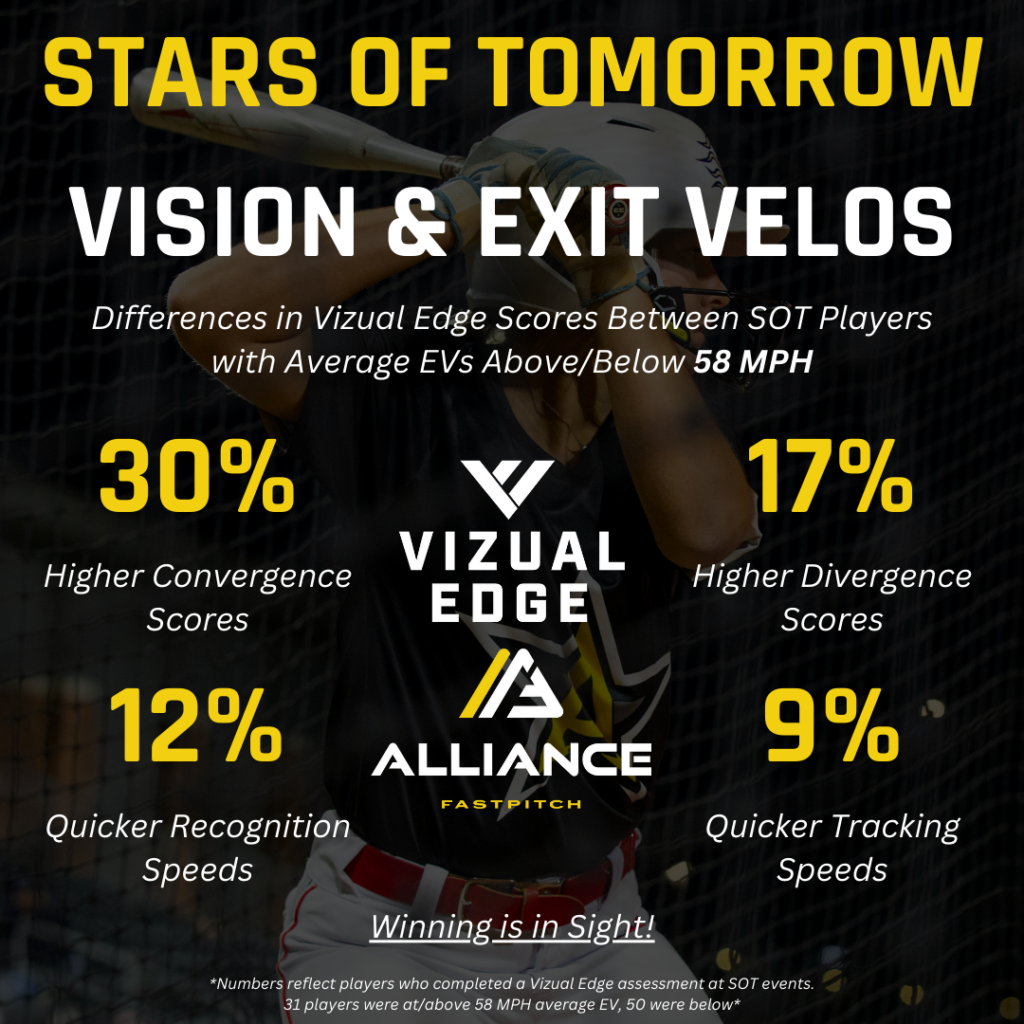
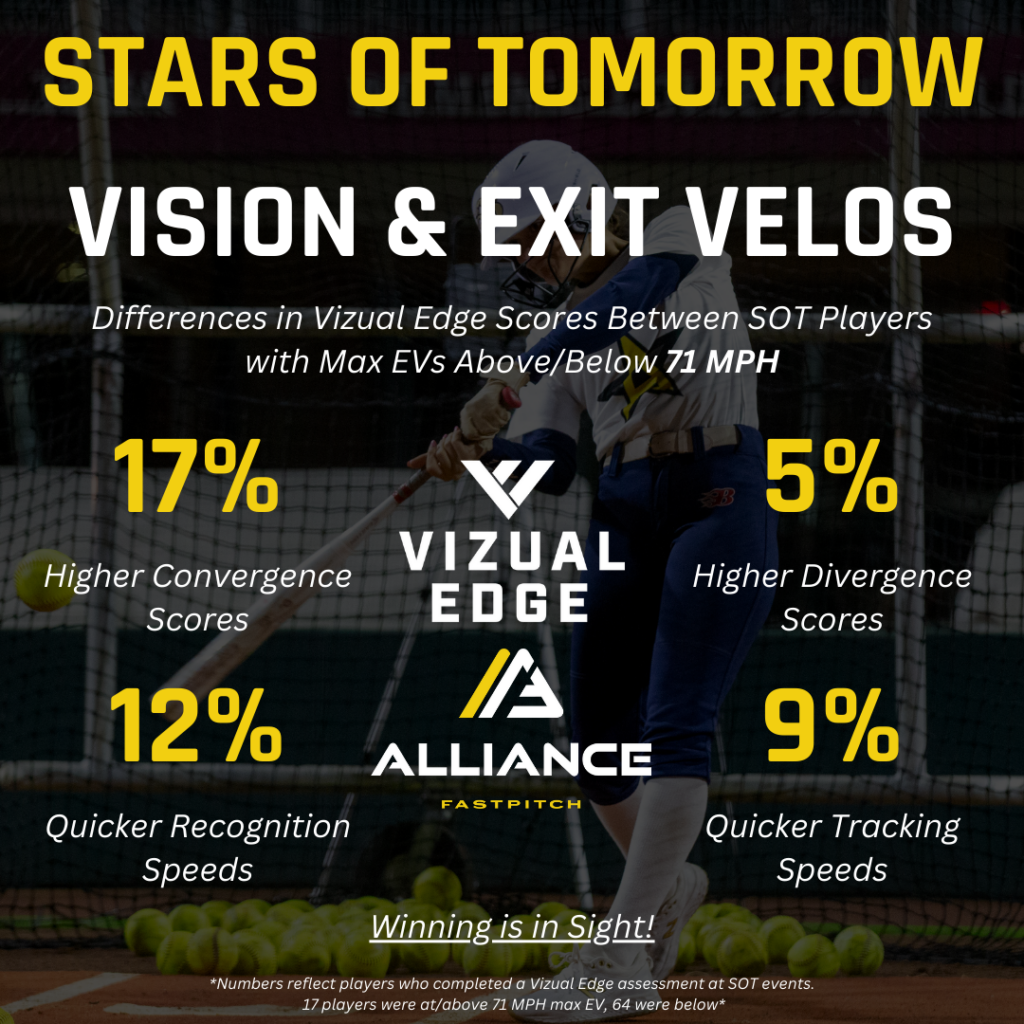
Hitting a softball is an incredibly difficult task, and the human brain can only process information so quickly. Similarly in baseball, a 2017 study from The Seattle Times found that "a 100-mph fastball takes roughly 375-400 milliseconds to reach the plate, and for reference, the blink of an eye takes 300-400 milliseconds."
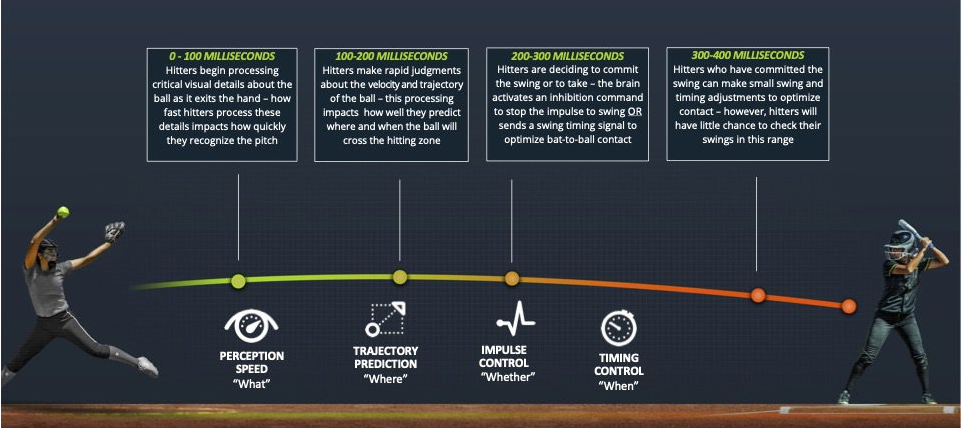
Visual processing speed is a focal point here at Vizual Edge, as everything starts with the eyes which tell your brain to tell your body what to do (i.e. swing!). If there are issues with the visual system, specifically Recognition and Tracking, a hitter cannot respond in time to swing and make solid contact. Recognition and Tracking are two important exercises on the Vizual Edge test that relate to a player's visual processing speed, and are also trainable skills. Along with the exit velocity data shown above, hard-hit percentage is another metric that was correlated with our visual tests at the SOT events. Hard-hit percentage (%) is defined as the number of times a player hit a ball harder than their 90th percentile exit velocity. Players that are elite at picking up spin (Depth), then quickly process a pitch type (Recognition) and can track the ball all the way to the plate (Convergence) can hit the ball harder and more frequently, and subsequently have better overall visual skills.
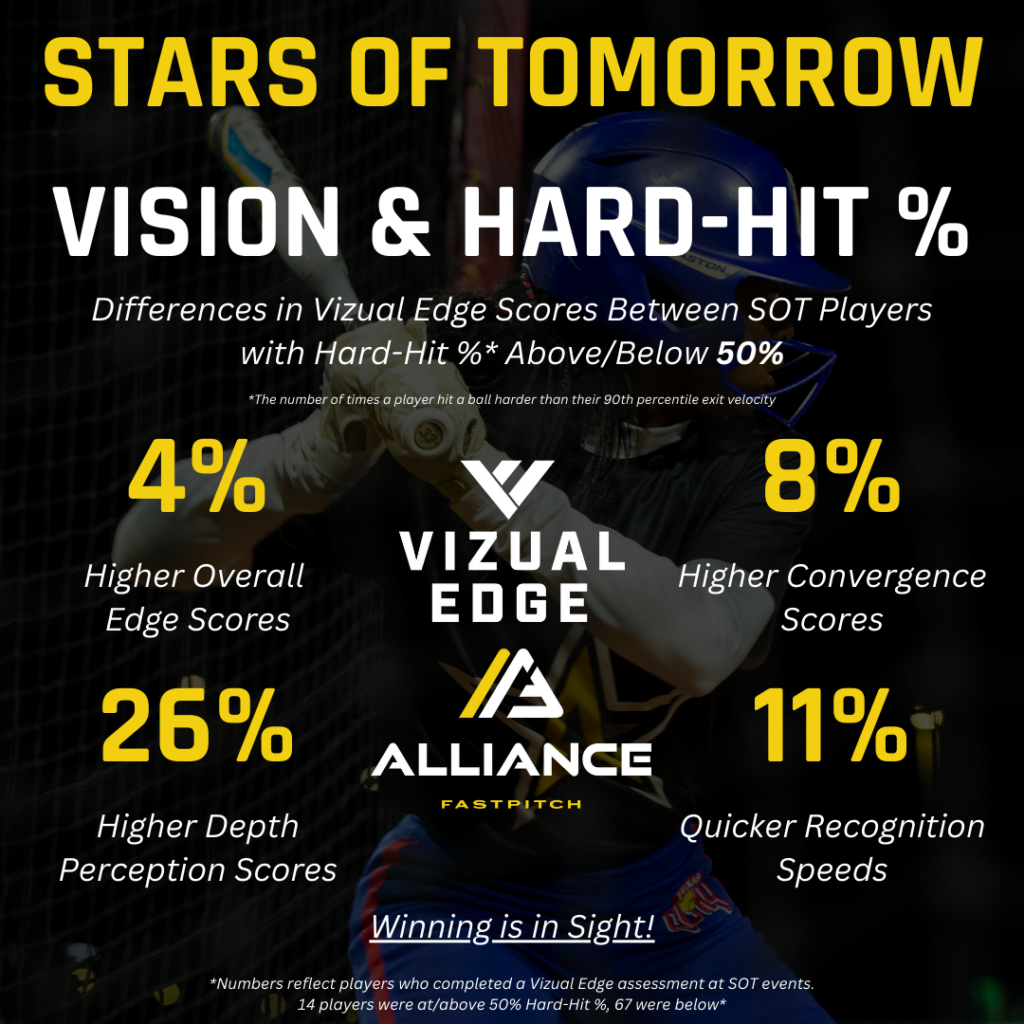
At the end of the day, vision alone isn't going to turn you into star of a softball player, but it does play a critical role in your overall performance and could be holding your game back. There are many variables that make the entire profile of an athlete, and Vizual Edge believes visual skills are one of them. Regardless of what your scores are now, visual skills are trainable and something you can do right at home!
Vizual Edge trains each of these visual skills in a simple, online platform called the Edge Trainer. It is designed to improve each of these skills in just 15 minutes, 3x a week, right from home and all on your own computer/iPad. Vision training is the easiest way to improve performance, and knowing how important vision is in softball, what are you waiting for?
To learn more about the Vizual Edge online vision training/evaluation program and unlock exclusive Alliance discounts, please visit thealliancefastpitch.com/vizualedge/.